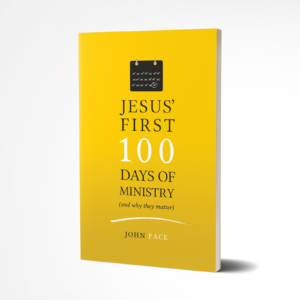Ready to leave the safety of the status quo…
…and make living in the Spirit a characteristic of your very being?
This is an adapted excerpt from chapter 5 of my book, Jesus’ First 100 Days of Ministry and Why They Matter.

If you would like to read all seven of the leadership principles Jesus established in His first 100 days, check it out here.
This post, like all of Jesus’ First 100 Days of Ministry (and Why They Matter), follows Michael Rood’s 70-week timeframe for Jesus’ ministry, as shared in Rood’s work ‘The Chronological Gospels.’ The writer marks Jesus’ baptism in the Jordan (Matthew 4:1-11) to the healing of the nobleman’s son as recorded in John 4:44-54 as the first 100 days of Jesus’ public ministry.
Making Living in the Spirit Your Modus Operandi
Modus Operandi, The Holy Spirit
“…born of flesh is flesh…born of Spirit is spirit” (John 3:6)
It is interesting to note the Lord birthed the need of the Spirit within His first 100 days, not to His disciples directly, but to a Judean sage, and member of the Sanhedrin none-the-less.
Born of Flesh
‘God is Spirit,’ is what Jesus would later say to the woman at the well; and His kingdom is like Him: spiritual. It was on day 57 of Jesus’ first 100[1] that He introduced this understanding; and it was not personally to His trustworthy selections (though some were probably within ear-shot); rather, it was to the status quo in the person of Nicodemus.
The status quo, as evidenced by the happenings at the Temple (see Chapter 4), had fallen into a dull routine, presided over by worldly men with a personal desire to get rich and exercise their authority. But God’s kingdom is anything but dull routine marked by the unremarkable. Conversely, it is a vibrant life-giving realm that is constantly growing, and remarkably changing. It is dynamically alive! But the status quo, steeped in the safety of the lethargic, can’t grasp the challenge and discomfort of increase (at least not yet, as in Nicodemus’ case). Thus, the status quo will seek to destroy.
It is through the life-giving Spirit that status quo stagnation can be defeated.
Born of Spirit
Essentially what Jesus was saying to Nicodemus was ‘like begets like;’ that is, what is born of the flesh is flesh, but what is born of the Spirit is spirit. To live in God’s kingdom, you must be born again. You must be born of the Spirit to be in the realm of His spiritual kingdom. That night the status quo failed to hear the words of Spirit, but what did not fail was Jesus laying the foundation of how things work in the kingdom: it is by, and in, and through the Spirit. You must be born again in every aspect of kingdom life, from the initial birth called salvation to the ‘birthing’ of every new direction and life-path.
Born Again
The born-again experience is fundamental to the evangelical Christian. It is certainly nothing new. But here is the challenge in the modus operandi:
Once inside the kingdom, new births must continue—not a repeat of the initial nativity that brought you into the kingdom—but all actions, vision, and understandings all must be birthed of the Spirit to be genuine kingdom endeavors.
They cannot be of the flesh, even though they may sound good and seem correct in the natural, the flesh is not the matrix for the spiritual. The essential point is this: “…they that are in the flesh cannot please God” (Romans 8:8).
Just because we are in the kingdom through the new birth does not eliminate the flesh and blood of our bodies (as we saw in Chapter One). The truth is we will always have a wrestle of some sort between flesh and spirit until these corruptible bodies put on incorruption (see my post on learning obedience here). None of us will be immune, and to think we ever get to ‘that place’ of immunity is a complete fallacy. The father of the faithful, Abraham, had an action of the flesh with the birth of Ishmael. Simon Peter had a fleshly vision lapse in backing down to a Jewish contingency regarding Gentile inclusion (cf. Galatians 2:2-13). There were those in Paul’s company who misunderstood the words of the Spirit in Agabus’ prophecy (cf. Acts 21:10-14). Indeed, none of us are immune from our flesh.
Crucify the Flesh
It would be remiss to not mention briefly how to stay in the modus operandi: “And they that are Christ’s have crucified the flesh with the affections and lusts: (Galatians 5:24). This crucifixion begins with salvation. “This initial act of faith in the Lord Jesus which resulted in the crucifixion (putting to death) of the affections and lusts of the totally depraved nature, is followed during the life of that Christian, by the free action of his liberated will in counting himself as having died to (having been separated from the power of) the evil nature with the result that he says NO to sin and stops yielding himself and his members to sin.”[2]
What then strengthens us to say ‘no’ in the Christian walk is the practice of the spiritual disciplines that can be seen in the practices of purging possessions, curbing the impulse to acquire, fasting, radical generosity and hospitality. •
Enjoyed this piece on living in the Spirit?
Check out Jesus’ First 100 Days of Ministry (and Why They Matter) for more like this!
[1] Rood, Michael John, The Chronological Gospels (Fort Mill, SC: Aviv Moon Publishing, 2013).
[2] Wuest, Kenneth Samuel, Wuest’s Word Studies from the Greek New Testament: For the English Reader, 3 vols. (Grand Rapids, Mich.: Eerdmans, 1973).




